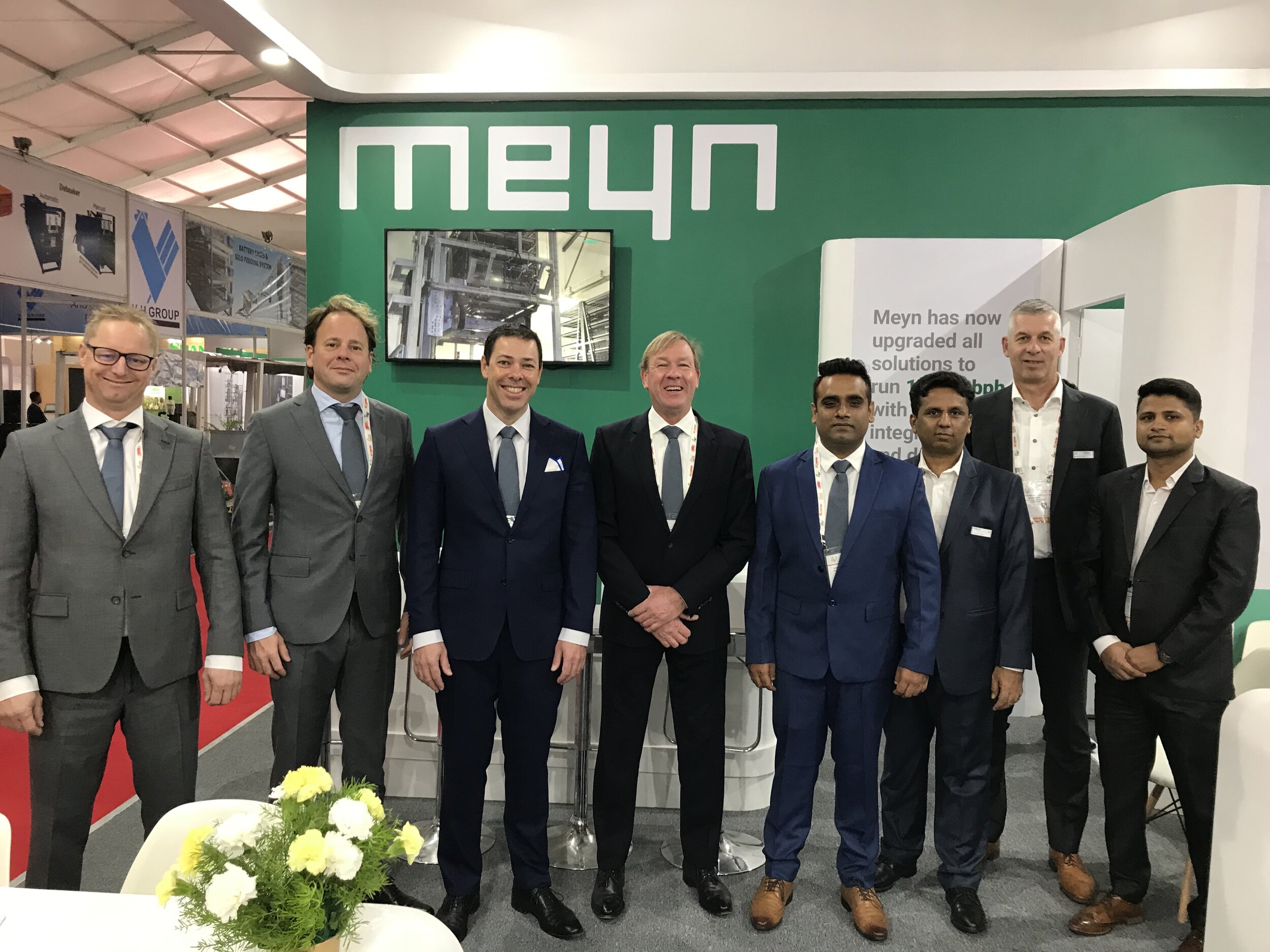Meyn is one of the largest chicken processing companies in the world and is active in more than 100 countries. Yet it took the company from Oostzaan more than twenty years to gain a firm foothold in India. "We had to sow a lot of seeds in India before we could start harvesting, but it was worth it," says Karel de Waal, senior sales manager India for the meat processing specialist. "Because of our patience, we now have over 50% of the market."
Third from left: Karel de Waal with the Indian team on the right
Until 2018, Meyn employed only one agent to represent the multi-billion dollar company in India. "With Alok Raj, our agent, we were extremely lucky at the time. Before we started working with him, we had a few less smooth collaborations that didn't yield much. But when we got in touch with Alok, there was an immediate click. He broke up the market for us."
According to Karel, this was mainly due to Alok's strategy. "In the 20 years he worked for Meyn in India, he was more of a consultant than a salesman. In India, building a personal relationship is extremely important when doing business with each other. He would work with the entrepreneur to see how the production process could be made more efficient or even help start-ups design entire factories," says Karel with a smile. "And those factories actually came about, because the entrepreneurs felt they could always count on us and that was the turning point when we could start charging for our service."
Subsidiary in India
After working with their agent for twenty years and gaining a solid foothold in the Indian market, it was time for Meyn to start a wholly owned subsidiary in India. "Before we had the office, we actually arranged everything from the Netherlands. From sales to installation and after-sales. But as a company we want to be as close to our customers as possible. That is our global strategy. We have a total of 16 after-sales offices, where we work in the local language and currency and sell spare parts. But especially in India, this kind of quick after-sales service is very important."
On the advice of Meyn's owner, the Berkshire Hathaway group, a law firm that the Berkshire Hathaway group already had experience with was used to set up the Indian office. "But in retrospect, they may not have been the best party. It was a very big firm, which didn't want to make metres for us. We were led to believe that setting up would be a matter of months, but it ended up taking two years." According to Karel, the medium-sized full service accountancy firm they now work with could have carried out this process within a year. "As an international company, you shouldn't focus on size and international experience. It is more important that such a law firm has the right contacts in India and can focus its full attention on you."
Warren Buffet
But it was not just the lawyers who delayed the process. "They say the bureaucracy situation has improved a lot in India, but you still have to be patient. We got the strangest requests from the Indian authorities, which we as a multinational company simply could not comply with. For example, they asked us for a copy of the passport of our largest shareholder. In our case, that is Warren Buffet."
Inspection of the spare parts store in Delhi by Meyn's global sales director, Robbert Birkhoff
The recruitment of staff, on the other hand, went like clockwork, and that, too, was to the credit of agent Alok. "Our office is small, we have a team of three people who all have to be as all-round as possible. Not surprisingly, we knew everyone before they were hired. Our chief engineer and account manager had both worked for our agent for years. So we just had to find a director, as Alok himself was retiring. At the time, we had a lot of contact with an employee of the Agriculture Council of the Dutch Embassy in Delhi. He knew our company, the industry and had experience with the Dutch culture, so that was a perfect match."
Expanding the team in India
Meyn would love to expand the team in India now with a junior engineer, but due to the aftermath of the corona crisis, there is a global vacancy freeze. "It was exciting for a while what the virus outbreak was going to mean for our industry because in the first few weeks there was a rumor circulating in India that you would get Covid from eating chicken. But now that it is known that the virus probably came from a Chinese wet market we actually see new growth opportunities emerging in India."
Not only in China are the wet markets popular for selling meat and fish, even in India 90 percent of meat still comes from here. "We now hope that this will start to change. Not only because consumers will think differently about the freshness of meat from such a market, but also because Modi has dared to make bold choices before. He has already spearheaded a major sweep through major cities, so we hope he will come up with a plan to tackle these wet markets . India is the fifth largest producer of broiler chickens in the world and that already offers enormous potential, but if people start buying more chicken in the supermarket it will accelerate the automation of the meat processing industry."


